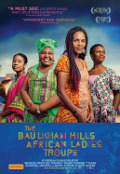
Directed by
Ros Horin
85 minutes
Rated M
Reviewed by
Chris Thompson

The Baulkham Hills African Ladies Troupe
Synopsis: In 2010, Sydney-based theatre director RosHorin decided she wanted to make a theatre piece based on the stories of four African refugee women from Baulkham Hills. Yarrie, Aminata, Yordy and Rosemary all had tales to tell – intense, emotional and sometimes horrific – about their experiences of rape and terror in their homelands and the joys and difficulties of coming to Australia. The documentary follows the five-year journey from the first creative meetings, to the show’s debut, to the triumphant final performance at the Sydney Opera House.There’s a lot going on in this film that is part harrowing tales of the abuse received in war-torn parts of Africa, namely Sierra Leone, Kenya and Eritrea and part fly-on-the-wall observations of the development of a community theatre piece. Both are fascinating and compelling in their own way but both also suffer from a lack of truly deep exploration of the subject matter. The film is not revealing enough in its exploration of the emotional pain behind the stories, nor does it go far enough into the messiness of the way a piece of community theatre gets made. Perhaps this is due to Ros Horin being both the documentary’s director and writer as well as being the theatre project’s director and writer (she claims that title even though the stories belong to the women). Given the sensitive nature of the stories she’s eliciting from the women and the demands of the devising and rehearsal process, it would have been far more elucidating to have had an impartial outside eye behind the camera.
This is not to say that Horin is not conscious of the sensitivities of the material she’s gathering. She is, and spends time reflecting on the issue and even seeks help in her approach from the local migrant and refugee service. But documenting yourself and your own work makes it hard to consider whether the very act of approaching these women and asking them not only to tell their painful and distressing stories, but to also be the performers in a professional live theatre production starts to stray into the area of exploitation. As it happens, the demands of rehearsals where they must tell their stories over and over again until the scene is right, takes its toll on them in different ways. The most extreme result sees Yordy question the process to the point where she leaves the group, unable to bear the emotional burden any longer. It’s the most authentic moment in the documentary and feels like it’s the story that you really want to know about.
But of course, the process of sharing your stories through theatre can also be a liberating and healing one and the success of the project is inspirational in the way it allows these four women – Yordy included – to rise above the ‘scars that never heal’ and to present themselves to the world as survivors; as strong, resilient women. One only hopes that after the final curtain call and the fuss and focus of the spotlight is no longer on them there are solid support services for these women.
The music in the show, mostly composed and performed by Aminata Doumbia, is terrific and accentuates the positivity of the performances which fill the theatre and elicit standing ovations wherever the show goes. But as a documentary, it feels more like a promotional ‘making of special’ than an insightful examination of the power of theatre to heal broken people and build a community.

Want more about this film?


Want something different?




